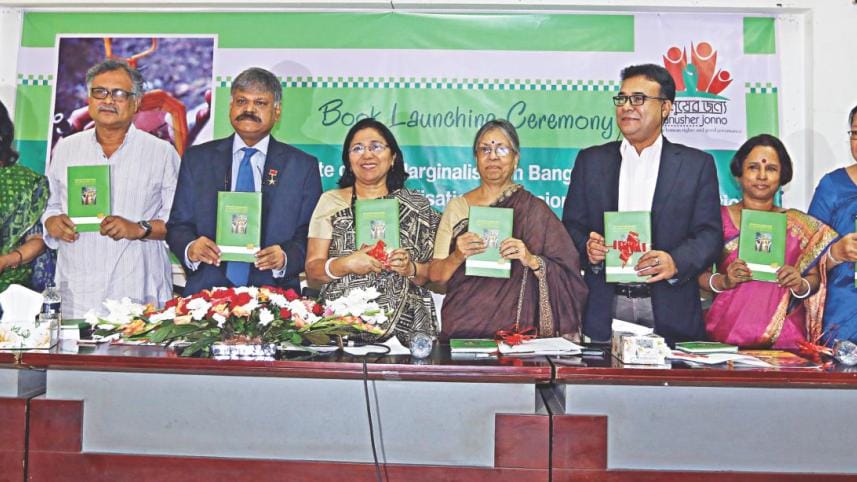Scourged by violence

Around 60 percent people from the marginalised communities in Bangladesh experienced violence more than two occasions last year, according to a new study.
On average, members of 33.9 percent households of these communities became victims of physical violence during that period.
Rights organisation Manusher Jonno Foundation (MJF) conducted the study on the state of marginalised people in Bangladesh. The survey was aimed at exploring their experience of discrimination, exclusion, rights violation and overall process of marginalisation.
The study report has been published in a book titled “State of the Marginalised in Bangladesh 2016: Experience of Marginalisation, Exclusion and Rights Violation". The MJF unveiled the book at a discussion at the Jatiya Press Club yesterday.
A total of 2,000 households from 40 field sites in 18 districts were surveyed for the study. The households were from 16 marginalised communities -- Chakma, Khyang, Khumi, BAWM, Marma, Tripura, Garo, Santal, Oran, Harijan, Rishi, Kaiputra, traditional fisher folk, Hindu & Christian, brothel-based sex workers and people with disabilities.
According to the report, different powerful actors including majority people, law enforcement agencies, household members, close relatives and other influential individuals or groups in the society are perpetrators of violence against the marginalised people.
“Violence against marginalised communities is widespread in Bangladesh and is on the rise due to the absence of the rule of law as well as persistent institutional discrimination and inequalities.”
The study revealed that majority groups torture the marginalised people physically and mentally, evict them from their homes or settlements, grab their land, threaten them with harm if they do not vote for the candidate from the majority side, block their participation in social and religious events and refuse the right to their inherited properties.
Other violence includes killing, abduction, rape, trafficking, destruction of properties and looting of assets.
“Over 32.3 percent of the marginalised community is mentally tortured by majority people in their locality,” the report said.
On average, 1.56 percent respondents informed that female members were victims of rape. Besides, 21.9 percent household members faced other forms of sexual assaults last year.
The prevalence of sexual violence is higher compared to other forms of violence against the marginalised communities, the report added.
It stated that more than 61 percent sex workers faced highest number of violence while religious minority communities faced the lowest 21.70 percent in 2016.
Apart from this, 41.6 percent households from Dalit communities, 39.8 percent from Adivasi communities in the plains and 33.67 percent people with disabilities experienced different forms of violence, harassment and threat throughout the last year.
Marginalised people are subjected to violence and torture not only by the people from the mainstream society, but also by law enforcement agencies, reads the report.
The study found that the prevalence of forcible eviction of the marginalised people from their homes and settlements has been on the rise. Besides, indigenous people in the plains and in hilly areas, Hindus and sex workers face the highest threat of eviction.
The survey pointed out that indigenous people in the plains are more vulnerable to eviction from their homesteads for two reasons -- they are poor and they are religious minorities.
Shaheen Anam, executive director of Manusher Jonno Foundation, said people from influential quarters want to keep the marginalised people “powerless”.
She said people should change their mentality to overcome the worsening situation of the marginalised people. “We are all trying to ensure the basic needs of the marginalised communities. The other important point is dignity. We have to ensure that too as it is also their fundamental right. But unfortunately fundamental rights are being violated in the country time and again.
“We have a responsibility towards the minority people. We should not depend only on the state. We have to bring changes to our personal life as well. We have to increase our capacity to accept the differences -- it could be differences of opinions and religions. We have to keep in mind that we are citizens of Bangladesh,” she added.
Addressing the discussion, eminent rights activist Sultana Kamal praised the report as a comprehensive study and a step forward to achieve an equitable society.
She said the state is not solely responsible for ensuring equality, but its citizens are also responsible. “It's a national problem. So we have to be united to address the problem. We have to identify whether the marginalised groups are lagging behind or made to lag behind. Otherwise, we will be betraying the spirit of the Liberation War which inspired us to ensure an equitable society for all.”
Former chairman of National Human Rights Commission Mizanur Rahman said the disparity between the people from mainstream society and marginalised people was still prevailing in the society, although the country achieved independence 45 years ago.
Criticising the country's civil society, he said it was not working properly and failed to put forward inputs for battling social injustice.



 For all latest news, follow The Daily Star's Google News channel.
For all latest news, follow The Daily Star's Google News channel.
Comments